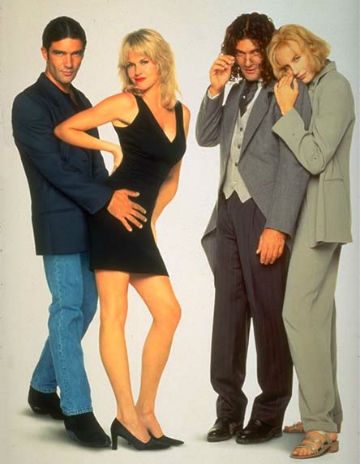
It will be difficult to find a less
faithful script in the history of screen adaptations than the one
on which the film "Two Much" is based. The material drawn from the
novel only takes up one piece of paper [...] Let us say that we are
talking about a black novel with considerable humor. It is a rather
special novel because it deals with an amoral character; the book
is close to the world of Jim Thompson: a comedy that is surly and
very black. When I read the book I thought it had the necessary
substance to make a comedy. I recall the time when in an interview
for the French magazine Polar, Westlake said that for him it was an
experiment to write a novel about a scoundrel and then see if the
readers followed what he wrote and became involved with what
happened to the character. The novel can be described as one of
almost dirty realism. Anyway, to mention the main differences
between the book and the film: in the novel, which doesn't unfold
in Miami but in the outskirts of New York, the character is a man
who wants money; he isn't a painter and doesn't have a gallery but
a small kiosk that sells the sort of postcards with a sentence
written on them. He has huge financial problems. Then there are
these two rich heiresses who in the book are twins. The reason he
pretends to have an identical twin brother is so that he can
fulfill a sexual fantasy and at the same time rip off the money of
these two heiresses. He ends up killing them both.
But the most outstanding difference is that when I decided to make
the film, what was of interest to me was to portray a character who
is a rascal to some extent but with whom one might identify,
something that was necessary for the type of comedy I had in mind.
Then, on the other hand, for the movie version, I thought the fact
that the women should be twins was a complete mistake, not only
because of the technical problems it posed but because it would
have in turn overshadowed and lessened the efficacy of the fact
that he should pretend to have a twin brother himself. What
appealed to me was how to make another version of this classic
topic about the disguise or impersonation of somebody's identity,
although I wanted the variation to be minimal. And that is perhaps
what attracted me about the idea of the male twin; he is someone
who disguises himself of none other than himself so, in a certain
way, he doesn't disguise himself at all. And the most difficult
thing was to preserve the balance between realism, credibility and
the tradition of the genre. I didn't want the film to turn into
clownish nonsense nor into a dramatic work while retaining the
efficacy of the situations, of gags.
FERNANDO TRUEBA